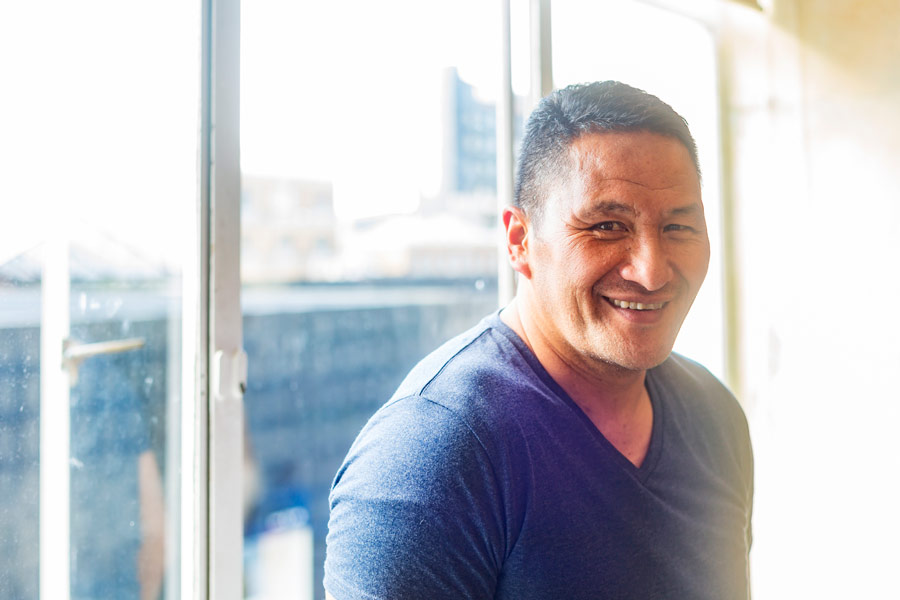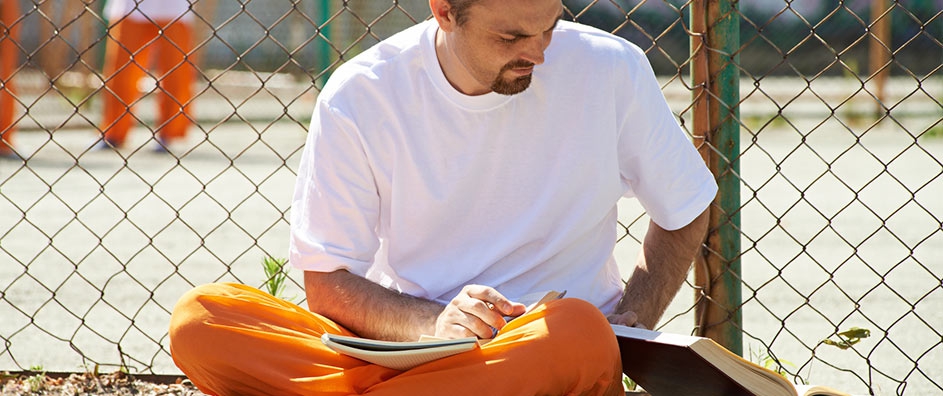The views expressed in our content reflect individual perspectives and do not represent the authoritative views of the Baha'i Faith.
I am convinced that imprisonment is a way of pretending to solve the problem of crime. It does nothing for the victims of crime, but perpetuates the idea of retribution, thus maintaining the endless cycle of violence in our culture. It is a cruel and useless substitute for the elimination of those conditions–poverty, unemployment, homelessness, desperation, racism, greed–which are at the root of most punished crime. – Howard Zinn, You Can’t be Neutral on a Moving Train
Almost everyone who is locked up now is going to be set free one day. If we treat prisoners like animals the whole time they are locked up, that’s what we’ll get when they’re back on the streets: wild, dangerous animals. – Christopher Zoukis, College for Convicts: The Case for Higher Education in American Prisons
If a man steals one dollar, he is called a thief and put into prison; if he rapes and pillages an innocent country by military invasion, he is crowned a hero. How ignorant is humankind! – Abdu’l-Baha, The Promulgation of Universal Peace, p. 103.
Crime hurts. Justice should not only punish and rehabilitate the criminals, but should also heal the victims.
That’s the philosophy of the restorative justice movement. Have you heard about it? Here’s the basic idea: most criminal justice systems seek official state retribution—they punish offenders, usually with prison or even by execution. Some more evolved systems seek not only punishment but rehabilitation, treating offenders therapeutically and educationally with the goal of stopping future crimes. But restorative justice systems not only punish and educate, they go beyond those usual parameters by seeking some form of restitution, by requiring offenders to take responsibility for their actions, and through a consultative process of dialogue and healing between victims and victimizers. Rather than ignoring the victims of crime, restorative justice makes them an integral part of dealing with its causes and its consequences.
Traditional criminal justice asks three basic questions: what law was broken, who did it, and what punishment best fits the crime? In contrast, restorative justice asks:
- Who has been hurt?
- What are their needs?
- Whose obligations are these?
- What are the causes?
- Who has a stake in the situation?
- What is the appropriate process to involve stakeholders in an effort to address causes and put things right? – Howard Zehr, Changing Lenses: A New Focus for Crime and Justice, p. 271.
As you can see, restorative justice (RJ) focuses on crime’s victims first. RJ takes its main cue from ancient legal systems like the Code of Hammurabi and the Mosaic property laws of the Pentateuch, which viewed crimes as primarily injurious to people rather than injurious to the state. Those codes required restitution for criminal actions, and emphasized repairing the human relationships injured by crime. Sometimes called victim-offender mediation, restorative justice encourages victims to tell their story and express their pain directly to those who injured them; and allows offenders to admit to their crime, express remorse and compensate the victim with monetary restitution, commitment to a course of education and community service.
Many of the world’s legal systems already follow this restorative path, or did so in the past—from Native American and First Nations peoples in North America to the Maori tribal systems in New Zealand. In tribal or nomadic societies without prisons, restorative justice centers on repairing the breach in the group dynamic that crime always creates, and rebuilding lost reciprocity and unity in the culture. The Maori Utu system, for example, protects individuals, the integrity of the group and the cohesiveness of society with its emphasis on restoring balance after the commission of crimes. In the same way, religious groups like the Quakers and the Mennonites practice various restorative justice techniques, believing that they produce much better results than purely punitive legal systems.

The Baha’i teachings call for a similar approach to crime, punishment and imprisonment, saying that the current system of incarceration and harsh punitive measures has a “most detrimental effect:”
The body politic is engaged day and night in devising penal laws and in providing for ways and means of punishment. It builds prisons, acquires chains and fetters, and ordains places of exile and banishment, of torment and hardship, seeking thereby to reform the criminal, whereas in reality this only brings about the degradation of morals and the subversion of character. The body politic should instead strive night and day, bending every effort to ensure that souls are properly educated, that they progress day by day, that they advance in science and learning, that they acquire praiseworthy virtues and laudable manners, and that they forsake violent behaviour, so that crimes might never occur. At the present time the contrary prevails: The body politic is ever seeking to strengthen penal laws and securing means of punishment, instruments of death and chastisement, and places of imprisonment and exile, and then waiting for crimes to be committed. This has a most detrimental effect.
But if the masses were educated so that knowledge and learning increased day by day, understanding was broadened, perceptions were refined, morals were rectified and manners reformed — in a word, that progress was made with respect to every degree of perfection — then the occurrence of crime would subside. – Abdu’l-Baha, Some Answered Questions, newly revised edition, pp. 312-313.
In the next installment of this series of essays, we’ll explore the Baha’i teachings for preventing criminal behavior and making society peaceful and crime-free.
Next: Open a School Door, Close a Prison
You May Also Like
Comments

















focus to "crime's victims first" should
cause some small "humanizing"
effect on our awareness, which might
even make a victimizer hesitate just
long enough to reconsider. I have to trust that many people already in the system would respond
to restorative justice fairly well, from
David's article and from what Connie
says. The reality of repeat offending
in our present system doesn't mean
the new approach would fail as well.
However, I have the feeling that there
are a great many sociopathic or ...
narcissistic folks in prison into whom
it would be very hard to instill a
"humanized" sensibility. Still, what
can we lose by trying a new way?
I think Stephen is right to bring the
relevant topic of "victimless crime"
into this discussion. Although that
concept may be somewhat of a myth,
as Connie implied, I believe rampant
incarceration for nonviolent crimes
is an outrageous and counterproductive thing we have to
eliminate.